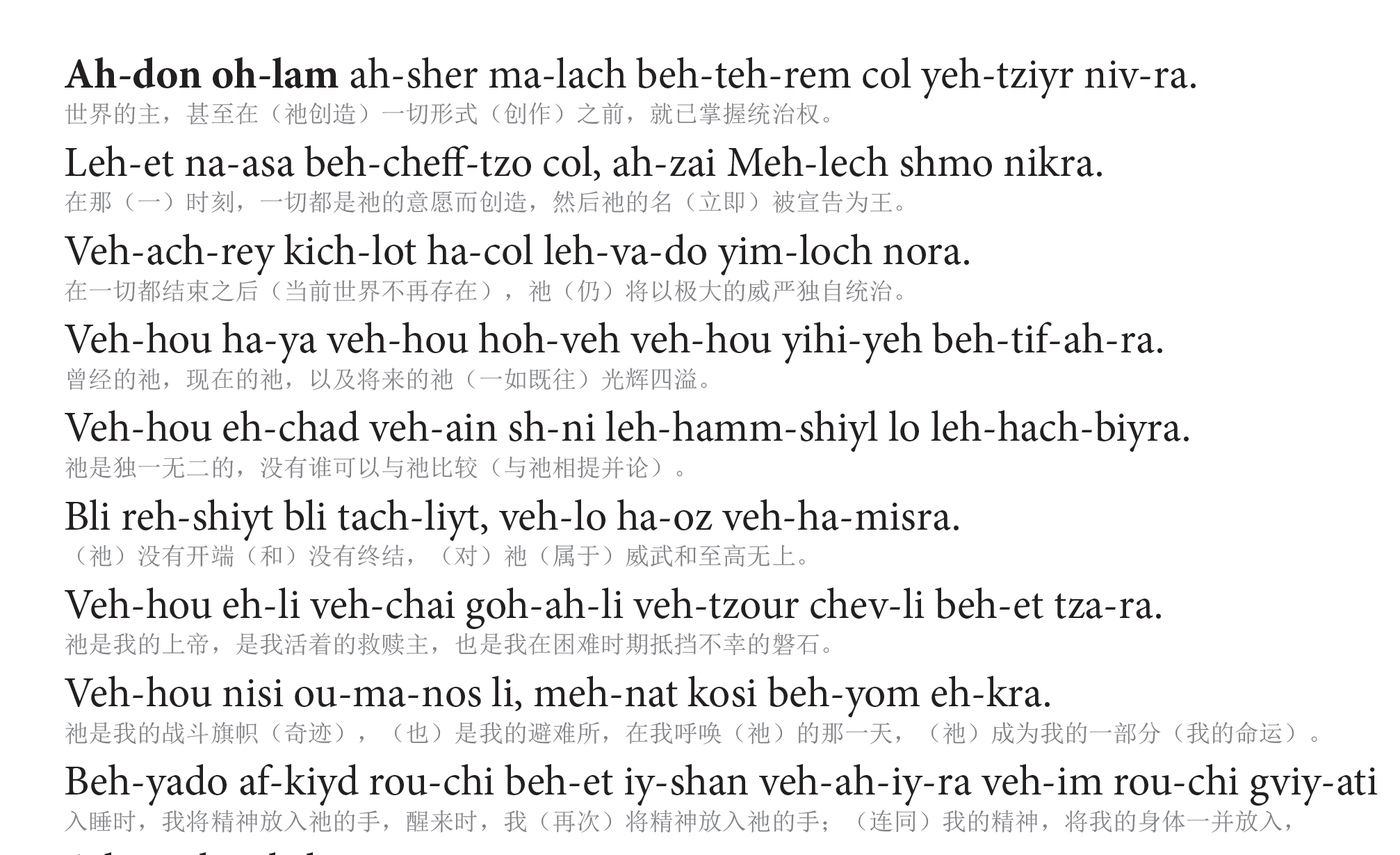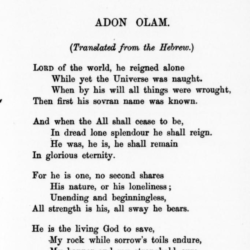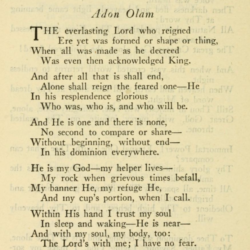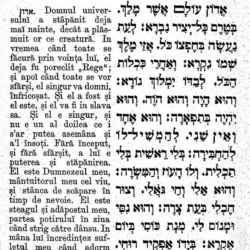| Source (Hebrew) | Translation (Chinese) |
|---|---|
אֲדוֹן עוֹלָם אֲשֶׁר מָלַךְ בְּטֶֽרֶם כׇּל־יְצִיר נִבְרָא׃ לְעֵת נַֽעֲשָׂה כְּחֶפְצוֹ כֹּל אֲזַי מֶֽלֶךְ שְׁמוֹ נִקְרָא׃ |
世界的主,甚至在(祂创造) 一切形式(创作)之前,就已掌握统治权。 在那(一)时刻,一切都是祂的意愿而创造, 然后祂的名(立即)被宣告为王。 |
וְאַֽחֲרֵי כִּכְלּוֹת הַכֹּל לְבַדּוֹ יִמְלֹךְ נוֹרָא׃ וְהוּא הָיָה וְהוּא הֹוֶה וְהוּא יִֽהְיֶה בְּתִפְאֲרָה׃ |
在一切都结束之后(当前世界不再存在), 祂(仍)将以极大的威严独自统治。 曾经的祂,现在的祂, 以及将来的祂(一如既往)光辉四溢。 |
וְהוּא אֶחָד וְאֵין שֵׁנִי לְהַמְשִׁיל לוֹ לְהַחְבִּירָה׃ בְּלִי רֵאשִׁית בְּלִי תַּכְלִית וְלוֹ הָעֹז וְהַמִּשְׂרָה׃ |
祂是独一无二的, 没有谁可以与祂比较(与祂相提并论)。 (祂)没有开端(和)没有终结, (对)祂(属于)威武和至高无上。 |
וְהוּא אֵלִי וְחַי גּֽוֹאֲלִי וְצוּר חֶבְלִי בְּיוֹם צָרָה׃ וְהוּא נִסִּי וּמָנוֹס לִי מְנָת כּוֹסִי בְּיוֹם אֶקְרָא׃ |
祂是我的上帝,是我活着的救赎主, 也是我在困难时期抵挡不幸的磐石。 祂是我的战斗旗帜(奇迹),(也)是我的避难所, 在我呼唤(祂)的那一天,(祂)成为我的一部分(我的命运)。 |
בְּיָדוֹ אַפְקִיד רוּחִי בְּעֵת אִישַׁן וְאָעִֽירָה׃ וְעִם רוּחִי גְּוִיָּתִי אֲדֹנָי לִי וְלֹא אִירָא׃ |
入睡时,我将精神放入祂的手, 醒来时,我(再次)将精神放入祂的手; (连同)我的精神,将我的身体一并放入, Hashem与我同在,我不会害怕。 |
This Chinese translation of an Ashkenazi nusaḥ for the piyyut “Adon Olam,” is found on page 73 of the liner notes for the Chinese edition of Richard Collis’s album We Sing We Stay Together: Shabbat Morning Service Prayers (Wǒmen gēchàng, wǒmen xiāngjù — Ānxírì chén dǎo qídǎo).
“Adon Olam” is a piyyut that became popular in the 15th century and is often attributed to Solomon ibn Gabirol (1021–1058) and less often to Sherira Gaon (900-1001), or his son, Hai ben Sherira Gaon (939-1038). The variation of the piyyut appearing here is the 10 line (5 stanza) version familiar to Ashkenazi congregations. (Sefaradi siddurim have 12 line (six stanza) variants, and there are some with 14 or 15 lines.)
Source(s)


“אֲדוֹן עוֹלָם (אשכנז) | 世界的主 | Adon Olam (Shìjiè de zhǔ) — Chinese translation by Richard Collis (2022)” is shared through the Open Siddur Project with a Creative Commons Attribution-ShareAlike 4.0 International copyleft license.










Leave a Reply